Migration Is an Act of Desperation, Not a Crime
Driven by war and poverty, millions of people are on the move, putting their lives at risk. But rather than explore the reasons, authorities lock them up or threaten them with force.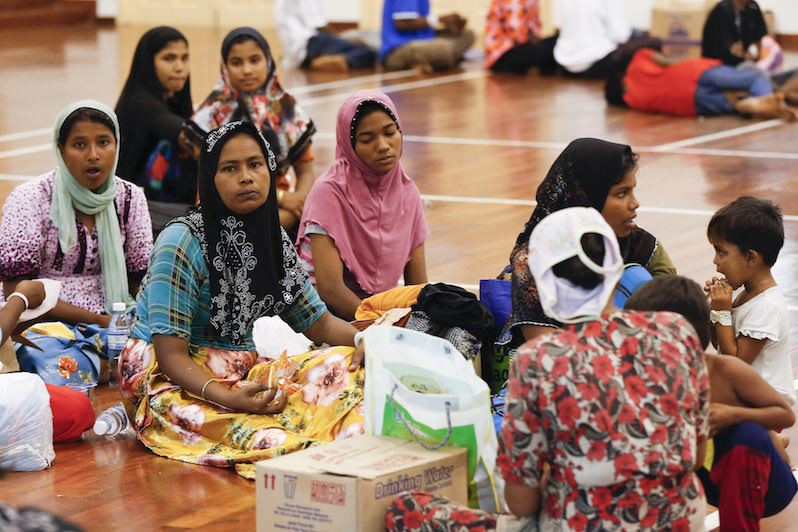 Immigrants from Myanmar resting at a temporary immigration detention center in Langkawi, Malaysia, on Tuesday. About 1,600 Rohingya and Bangladeshi refugees landed in Malaysia and Indonesia over the course of the day, after human traffickers apparently abandoned their ships and left the passengers to fend for themselves. (AP / Vincent Thian)
Immigrants from Myanmar resting at a temporary immigration detention center in Langkawi, Malaysia, on Tuesday. About 1,600 Rohingya and Bangladeshi refugees landed in Malaysia and Indonesia over the course of the day, after human traffickers apparently abandoned their ships and left the passengers to fend for themselves. (AP / Vincent Thian)
A father from Ivory Coast wanted to reunite his son with the rest of his family living in Spain. But the Spanish government denied him a family reunification visa. Desperate, he paid a Moroccan woman to smuggle his 8-year-old onto Spanish soil. On May 7, 2015, she attempted to do so by placing the boy, tightly folded into a fetal position, inside a carry-on suitcase and traveling to Spain. When airport authorities noticed she was nervous, they X-rayed her bag and were shocked to find the child.
Imagine the boy’s ordeal.
Imagine the father’s desperation.
It is situations like these, multiplied by the millions, that are playing out all over the world, in Syria, Libya, Iraq, Afghanistan, Eritrea, Myanmar, Bangladesh, Mexico, Honduras, El Salvador and elsewhere. Driven by war and poverty, millions of people are on the move, risking their lives to escape desperate circumstances. Unfortunately, the response from elites is to trap them, by putting them in jail or criminalizing traffickers and militarizing sea routes.
The Norwegian Refugee Council and Internal Displacement Monitoring Centre released a report in early May revealing that there were 38 million internally displaced people last year alone, nearly 5 million more than the year before. The record-breaking number includes 11 million refugees who were newly displaced and clustered in the Middle East and Africa, including Syria, South Sudan, Nigeria and the Democratic Republic of Congo. Council Secretary-General Jan Egeland said, “These are the worst figures for forced displacement in a generation, signaling our complete failure to protect innocent civilians.”
The number of people living outside their home countries is even higher. In 2013, the latest year for which statistics are available, the United Nations found that 232 million people are migrants or refugees, or, in effect, “externally displaced” people.
In the case of the boy smuggled into Spain in a suitcase, authorities simply arrested the father and placed the boy in protective custody, dashing any hopes for reunifying their family. This is a typical response. Instead of exploring what drives the desperation of migrants, authorities lock them up or threaten them with force.
Each week there is news of migrants stranded at sea, dying in large numbers, or locked up in prisons. In recent days, about 2,000 migrants were found off the shores of Indonesia and Malaysia, hailing from Bangladesh and the Rohingya community in Myanmar. They were rescued from several boats. The Rohingya are a community of Muslims from the northern region of Myanmar called Rakhine. They have been persecuted to such an extent that many consider them the victims of attempted genocide. The migrants had apparently been stranded by traffickers and told to swim ashore. In interviews, they said they had been at sea for two months and were extremely hungry and weak. They were headed to Malaysia and Thailand to find work. Thailand has been rocked by the recent discovery of mass graves of migrants, and in fact has been cracking down on immigration over the past several years.
According to the United Nations High Commissioner for Refugees, about 25,000 Bangladeshis and Rohingya from Myanmar attempted to migrate by sea during the first three months of 2015, twice the number from last year. Very little coverage of the persecution of Rohingya people in particular makes it into the U.S. media. President Obama lauded Myanmar as a “success story” during his visit there last year, effectively dismissing concerns over Rohingya persecution. Not far from Indonesia, Australia offers a particularly macabre example of how migrants are locked up for trying to find a better life. Earlier this year, imprisoned asylum seekers took drastic steps, sewing their lips shut to draw attention to the physical and sexual abuse they face. According to one news report, the Australian government houses migrants in locked facilities on islands like Papua New Guinea, Nauru and Manus “to remove the financial incentive for people smugglers, in the process saving hundreds of lives that might otherwise have been lost at sea in rickety boats.” Prime Minister Tony Abbott’s idea of saving people is apparently to lock them up in abusive conditions. The United Nations Special Rapporteur on Torture, Juan Mendez, singled out Australia for its torture and abuse of children asylum seekers in particular, to which Abbott responded that he was “sick of being lectured to.”
Binoy Kampmark, a senior lecturer at the School of Global, Urban and Social Studies at Australia’s Royal Melbourne Institute of Technology, said in an interview on “Uprising” that many of the refugees tend to come “from war zones that also had Australian involvement, namely Afghanistan and Iraq.” The response of the government, said Kampmark, “has been very hard-line” in imprisoning refugees in what he calls a “crude gulag archipelago.”
The situation in the U.S. is only marginally better. Even though there are now fewer deaths on the U.S.-Mexico border than before, the Obama administration has revived the cruel Bush-era practice of locking women and babies up as a “deterrent” to immigration, as I detailed in a previous column. With millions of undocumented immigrants living in the shadows, hundreds of thousands deported each year, and no prospect of a viable congressional solution to the crisis, people’s lives remain in limbo. A right-wing narrative that exhorts undocumented immigrants to simply “go to the back of the line” to legally immigrate ignores the reality that there is no line at all.
Except if you’re extremely wealthy. Foreign investors who pour half a million dollars into a business in the U.S. that they claim creates at least 10 jobs can simply buy their way into the immigration system through a special visa called the EB-5.
Nowhere has the refugee and migration crisis been as dramatic in recent months as in Europe. Since the start of the year, thousands of migrants have died attempting to cross the Mediterranean Sea into European nations like Italy. Migrants from Mali, Eritrea, Syria and Libya are packed onto flimsy boats, risking their lives to escape the brutal war in Syria and the violence and chaos of a post-U.S.-NATO invasion in Libya.
Italy, which is often the first place migrants arrive, ended its yearlong, highly successful search and rescue operation in 2014, after most European governments refused to provide funding. The Mare Nostrum program saved 130,000 lives before being replaced by a program with a third of the funding. But as Behzad Yaghmaian, a professor of political economy at Ramapo College of New Jersey, told me, the European view is that “rescue and save programs are actually a pull factor. They encourage more migration and more death.” The flip side is that allowing migrants to die at sea is what Europe considers an effective deterrent, rather like Australia’s imprisonment of asylum seekers. In recent weeks, internationally shamed by the humanitarian catastrophe, representatives of dozens of European Union nations met to discuss alternatives to mass death as deterrent. Unbelievably, instead of creating orderly and safe pathways for immigration and naturalization, Europe’s bright idea is to militarily target areas in Libya where boatloads of migrants launch. By criminalizing traffickers and militarizing sea routes, leaders are adopting the false narrative that the tens of thousands of Libyans, Syrians and other migrants are forced onto boats at gunpoint and dumped onto European seas and soil against their will. They are, in effect, trapping desperate people. It seems as though if the deaths are out of European sight, they are wiped clean from European consciences.
Imagine if, upon discovering the routes of the Underground Railroad during the era of U.S. slavery, people of conscience militarily attacked the escape routes instead of creating a safe haven for escaped slaves.
I have been an immigrant all my life. My parents left behind lives of grinding poverty in India before I was born and migrated to the Persian Gulf region like millions of South Asians have done, looking for a better life. As a teenager, I left the United Arab Emirates, heading to the United States for higher education, searching for an escape from the confines of a totalitarian and consumerist state.
Poverty, war, violence and repression are all too common for millions of people the world over, thanks in large part to the neoliberal economic wars and neocolonial military wars of the U.S. and Europe. Even though my family and I were among the lucky migrants who managed to survive displacement, I can relate to the desperate circumstances that drive the migration of those who have few options left to live a decent life. If our response to the human yearning for escape is to add to repression and violence, then we are very much part of the problem.
Your support matters…Independent journalism is under threat and overshadowed by heavily funded mainstream media.
You can help level the playing field. Become a member.
Your tax-deductible contribution keeps us digging beneath the headlines to give you thought-provoking, investigative reporting and analysis that unearths what's really happening- without compromise.
Give today to support our courageous, independent journalists.

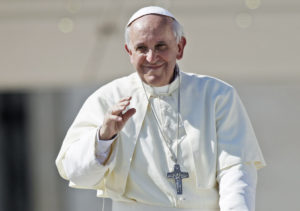
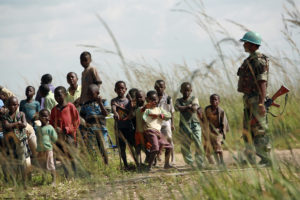
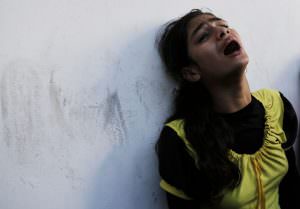
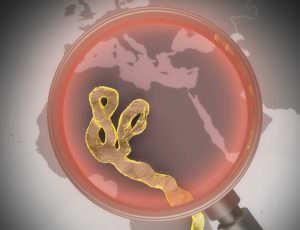
You need to be a supporter to comment.
There are currently no responses to this article.
Be the first to respond.